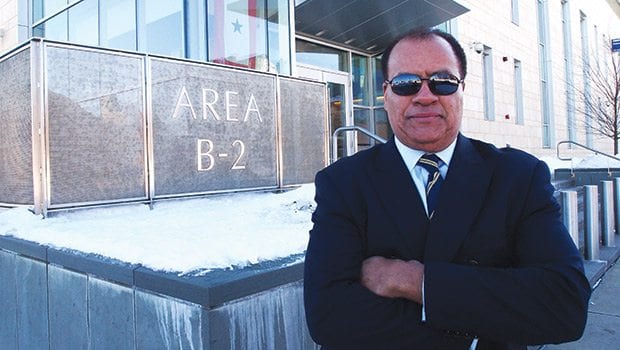BPD complaint process irks Roxbury resident
Dan Cruz suffered through a two-year process that sided in favor of the officer.

After a police officer at a construction site screamed at Daniel Cruz in December, 2012, Cruz filed a complaint at Boston’s Area B-2 police station. Two years later, after multiple phone calls and letters to unresponsive police personnel and a drawn-out process that found in favor of the officer, Cruz wonders how the department’s complaint process could work for any civilians.
“The process is awful,” he said. “At every stage of the way they’re trying to discourage you.”
Cruz’s ordeal began on Dec. 14, 2012 when he was driving through street construction near the corner of Washington and Guild streets. The traffic on Washington Street was restricted to a single lane, and Cruz, heading toward Egleston Square, was stopped. The officer motioned for Cruz to proceed, Cruz says, but then jumped in front of his car and ordered him to stop.
When the officer approached the car, Cruz rolled down his window. Cruz says he asked why the officer motioned for him to move and then stopped him. The officer denied he had done so.
“He drew a breath, and screamed at the top of his lungs,” Cruz said. “He was less than two feet away from me. He almost put his face in the car. He was disrespectful, he was aggressive.”
Throughout the encounter, Cruz says, he remained calm.
“I did not offer up any verbal retorts or talk back to him,” he said.
The officer told Cruz to back his car up and pull over to the side of the street. Cruz says he was detained by the officer for eight to ten minutes, while the officer took his license and registration and continued directing traffic. When the officer directed Cruz to leave the construction site, Cruz asked why he had been detained. The officer said, “If you have a problem, speak to my supervisor,” and motioned toward an officer, Sgt. Doris, standing near the corner of Washington and Circuit streets.
Doris’ initial response, as Cruz recalls in his complaint, was “What’s your problem?” Undeterred, Cruz filed a formal complaint with Area B-2 Captain John Davin.
“I find this entire incident very troubling, belittling and condescending,” Cruz wrote in his complaint letter. “I’m not sure why a Boston Police officer, while directing traffic, whether his signal was clear or unclear, would scream at a motorist who never raised his voice or said anything confrontational or disrespectful, pull him over, hold his license while he continued to direct traffic for some 8-9 minutes, and then tell him to go. Was this some type of punishment or condescending behavior? Is this common practice for the Boston Police Department? Verbal abuse isn’t acceptable anywhere that I’m aware of, why is it in the streets of Roxbury?”
Cruz’s complaint letter set in motion the BPD’s complaint process. Civilians who complain of police misconduct typically wait more than a year for a resolution. And a complainant’s chances of having their charges against an officer sustained are slim: Just 9 percent of all complaints against officers filed in 2012 were sustained within a year, according to the Community Ombudsman Oversight Panel (CO-OP)’s 2013 report, the last available report on the panel’s website.
In the months after filing his report, Cruz says he made 20 follow-up calls to a mostly unresponsive police department, including three unanswered calls to Captain Davin. While Lieutenant Sean Flaherty told Cruz the investigation into his complaint was concluded in March of 2013, neither Flaherty nor anyone else from the department would answer questions about when Cruz would receive a response to his complaint.
“I don’t understand,” Cruz wrote in an Oct. 30, 2013 letter to Boston Police Superintendent Frank Mancini, who oversees the department’s Internal Affairs Division. “I am verbally accosted by a police officer, I do what I’m supposed to do and stay calm and reserved, file a formal complaint and almost a year later the Boston Police Department doesn’t have the courtesy or any idea when they’ll respond.”
Twelve days later, Cruz received a letter from Mancini informing him that his complaint was unsubstantiated.
“An investigation was conducted into this incident, unfortunately we were unable to prove or disprove if Sergeant John Doris and Police Officer John Quinn’s actions during the incident were meant to be disrespectful,” Mancini’s letter reads.
On Nov. 26, 2013, Cruz filed a complaint with the civilian oversight panel. On Dec. 4, 2014, the CO-OP board responded with a finding that the department’s investigation into his complaint was fair and thorough. The three-person panel, which has neither the power nor the capacity to investigate complaints, reviews police investigations of misconduct to ensure investigations are conducted in a fair and thorough manner. Of the 30 cases the panel reviewed in 2012, it found that only four were not investigated in a manner that was fair and thorough.
“I thought the CO-OP board was an investigative unit,” Cruz said. “They’re not. It’s a joke. I thought it would be a legitimate appeal. It’s ridiculous. And it took them nearly 13 months to respond.”
The 30 cases the board investigated in 2012 were a thin slice of the 324 civilian complaints filed that year. Like many familiar with the CO-OP, Cruz thinks the Boston Police Department holds civilian complaints in low regard.
“The system doesn’t work,” he said. “I understand people’s frustration with law enforcement. From what I see, the department doesn’t take complaints seriously. Imagine if it wasn’t somebody as mature or experienced as I am dealing with this situation.”
Cruz said he was not looking for sanctions against the officer, just an acknowledgement that the officer’s behavior was unacceptable.
“An apology is all it takes,” he said. “People just want to feel like they have value.”







